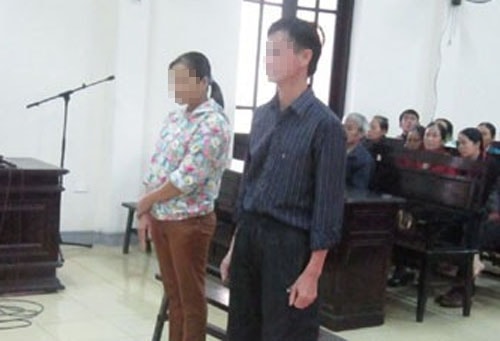3 difficulties in resolving divorce cases with foreign elements
(Baonghean)- To resolve divorce cases with foreign elements (the parties are abroad), the activity of judicial delegation abroad is a decisive issue in bringing the case to trial. However, currently, the implementation of delegation still faces many difficulties and problems....
Sad stories
Ms. D.TH, born in 1992 in V commune, YT district, and her husband, NKT, got married and had a son together. In 2012, Mr. T went to work as a freelancer abroad (Federal Republic of Germany).
After her husband left for a while, Ms. H noticed that Mr. T was behaving strangely. He no longer called her frequently and no longer cared about his wife and children. Meanwhile, at home, Ms. H and her mother-in-law often had conflicts. Her mother-in-law often scolded and separated Ms. H and her husband.
 |
| Lawyer Nguyen Trong Hai (Trong Hai & Associates Law Office) advises people on divorce procedures involving foreign elements. |
Since January 2014, Ms. H has not been able to contact her husband, and her son has been separated from her husband's family and not allowed to see them. At the peak, on his personal Facebook page, her husband even showed off happy photos with his new wife and son abroad. Desperate, Ms. H had to file for divorce.
However, her divorce was not very smooth because at first, the letter she sent to her husband stated that his address was Berlin, but now she herself does not know where her husband is living specifically in Germany.
Ms. NTKH in BT ward married Mr. N.D.C in D.V ward (Vinh city) in 2010. After getting married, Mr. C went to work in the Czech Republic. At first, he kept in touch with his wife regularly, but for the past 5 years, they have almost lost contact.
Ms. KH wanted to proceed with divorce proceedings to find a new life, but when she submitted her application to the court, it was not accepted because she did not have a specific address for her husband in the Czech Republic. Ms. KH fell into a "half-dead" situation, having a husband is like not having one, but she cannot find new happiness because on paper she and Mr. C are still legally married.
Many problems
According to lawyer Nguyen Trong Hai - Head of Trong Hai and Associates Law Office: currently, accepting and resolving divorce cases with foreign elements (the parties are abroad) is facing many difficulties and problems.
1st, on determining the jurisdiction of the court: According to the provisions of the Law on Nationality, "Vietnamese people residing abroad are Vietnamese citizens and people of Vietnamese origin residing, working and living permanently abroad". However, the time to determine "permanent" is not specifically regulated in any document. In the case of Vietnamese people going on business trips, studying or traveling, but when their stay in the host country expires, are they considered Vietnamese people residing abroad or not? This issue affects the determination of the court's jurisdiction.
 |
| Illustration photo |
Monday, regarding the settlement period, according to the provisions of Article 179 of the Civil Procedure Code, the time to settle a case, from the time of acceptance to the time of issuing a decision to bring the case to trial for civil, marriage and family dispute cases prescribed in Articles 25 and 26 of the Civil Procedure Code is 4 months (if complicated, 6 months)...
However, in reality, when handling cases with litigants abroad, the court cannot guarantee this deadline. Because the court cannot directly serve the litigants abroad, but must do so by post or through judicial commission. In particular, if served by post, the time for a specific procedural document to reach the recipient and respond to the court is at least 2 months, not to mention that the litigants abroad must arrange time to return to Vietnam...
Regarding judicial delegation, in many cases, the time from when the court sends the request for judicial delegation to the Ministry of Justice until the competent authority in the foreign country receives the dossier is quite long, not to mention the service must be carried out in accordance with the provisions of the law of the country where the party is residing. For example, in the case of Ms. TTT and Mr. Kim Yuang Ky (Korean), there have been two delegations (the first on December 19, 2014, the second on August 7, 2015) but to date they have not been resolved.
HardTuesdayoften fall into cases of ambiguity about the defendant's address abroad. There are many cases where Vietnamese citizens, even Vietnamese legal entities, do not carefully research the conditions and specific addresses of foreigners; of foreign legal entities; do not require foreigners or foreign legal entities to provide the address where they are living, the headquarters of the legal entity is operating... leading to the situation of rights and interests being violated.
 |
| Illustration photo, internet |
When filing a lawsuit in court, the address cannot be determined or the address of the foreigner is not available, making it very difficult for the court to determine the address. In many cases, the defendant in the case is a person who is abroad, when he knows that he is being sued in court, he always tries to avoid and change his address, so the court cannot summon him to participate in the proceedings and there is no sanction to deal with him.
According to Ms. Nguyen Thi Thu Ha - Chief Justice of the Civil Court, Provincial People's Court, in reality, there are quite a few cases that cannot be accepted for settlement due to lack of accurate address information of the parties, in which the parties are Vietnamese people living abroad often fall into the category of illegal workers, freelance workers, illegal workers...
There are also cases where Vietnamese women marry foreigners, the address on the marriage certificate is correct, but the documents sent to the foreign country do not arrive, they have to be supplemented, and according to the law, if the supplement is not successful, it must be suspended. That is the principle, many people do not understand and think that the court is making things difficult...
| According to statistics from October 1, 2014 to September 30, 2015, the Provincial People's Court accepted 69 divorce cases with foreign elements, of which 44 cases were resolved, 27 cases were not resolved; from October 1, 2015 to March 30, 2016, it accepted 81 cases, 57 cases were resolved, 24 cases remained, of which 12 cases were temporarily suspended. |
Gia Huy
| RELATED NEWS |
|---|




.jpg)



